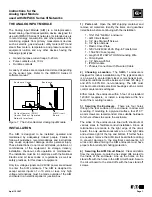
and 6.8 V, the NI roboRIO enters brownout mode with a staged response, as the following
table describes.
Table 2.
NI roboRIO Input Voltage Brownout Behavior
Stage
Input Voltage
Range
Behavior
1
6.3 V to 6.8 V
The +6 V voltage rail starts to drop.
2
4.5 V to 6.3 V
The NI roboRIO enters a brownout fault condition and the
following precautions are taken:
•
User voltage rails become disabled.
•
All PWM generation stops at the conclusion of the current
cycle.
•
GPIOs configured as outputs go to High-Z.
•
Relay control outputs are driven low.
•
CAN-based motor controllers become disabled.
The following systems continue to function normally with valid
data and communication:
•
FPGA, processor, RAM, disk, and user code
•
USB power and communication
•
Radio, if powered by USB
•
Ethernet
•
CAN
•
AI and AO
•
I
2
C
•
SPI
•
RS-232 serial
•
LED and RSL status lights
Stage 2 continues until the input voltage rises to greater than 7.5 V
or drops to less than 4.5 V.
3
Less than 4.5 V
All controller functions cease and the controller state is lost. This
condition continues until the input voltage rises to greater than
4.65 V, at which point the controller starts the normal booting
sequence. At startup, the controller remains in Stage 2 until the
input voltage rises to greater than 7.5 V.
Pinouts
The following describe the pins and signals on the NI roboRIO ports.
NI roboRIO User Manual
|
© National Instruments
|
7








































